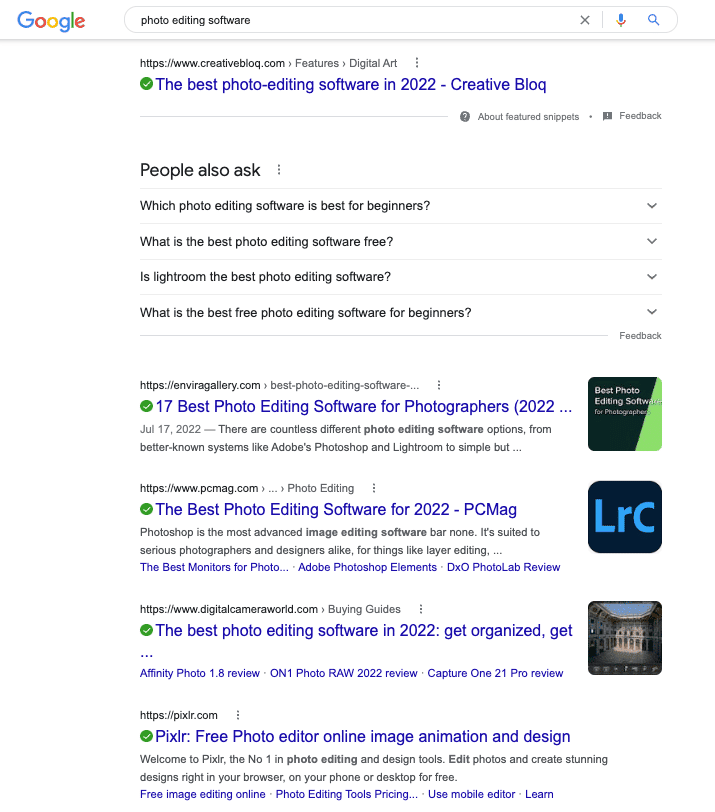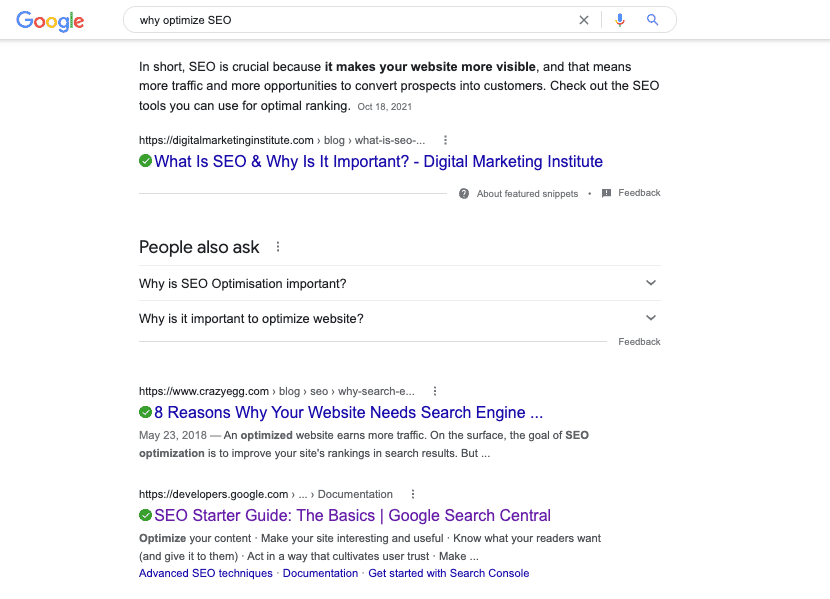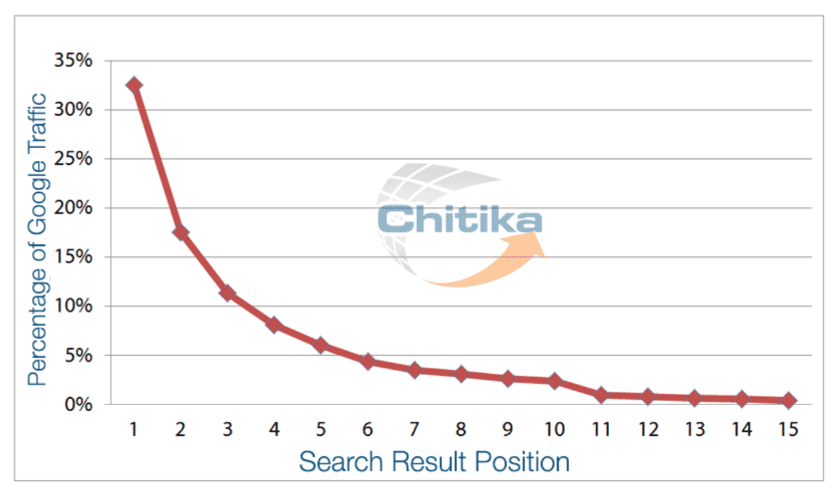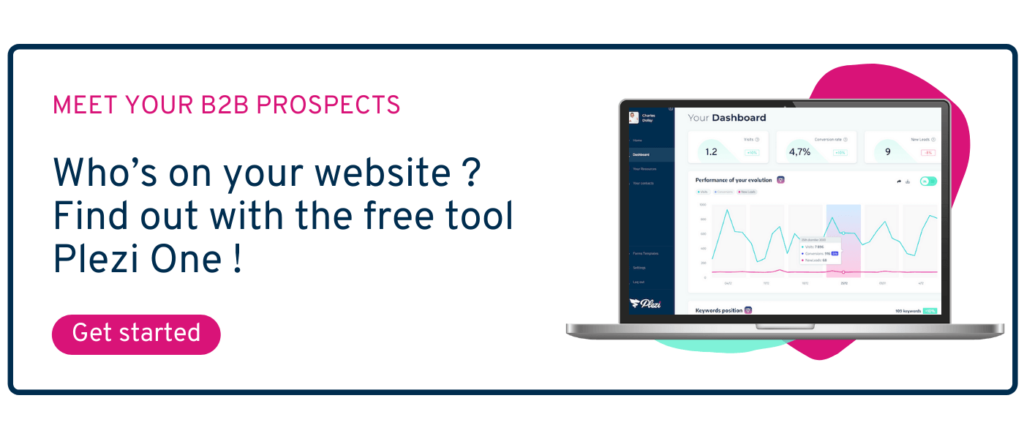Ranking first in Google for the keywords that best describe your business is a bit like being featured on the nightly TV news. It hugely increases the visibility of your company and is an invaluable source of website traffic and leads.
But how can you keep track of where your web pages rank on Google? And how can you improve your ranking? We’ll tell you everything you need to know in the post below.
In this post, we’ll look at:
- What is Google search ranking?
- Why you should rank first on Google
- Why you should track your ranking
- What factors affect Google ranking?
- How to track your Google ranking
- 15 ways to improve your ranking
 What is Google search ranking?
What is Google search ranking?
When someone enters a search query into Google, for example “photo editing software”, the search engine displays 10 results on the first page.
Google’s algorithm ranks these results and assigns a position to each website that features this keyword. This ranking is based on a number of factors that include things like website load speed, backlinks, and bounce rate. By doing this, Google aims to provide users with the best possible answers to their search query.
Looking at the example above for “photo editing software”, Google has used these criteria to produce the following results:
- Position 1: a blog post on the website creativebloq.com
- Position 2: a comparison of photo editing software from enviragallery.com
- Position 3: a blog post from digitalcameraworld.com
The Holy Grail of Google search results is the fabled position zero. Also called the featured snippet, this is a small block of text that is displayed at the very top of some search results. Google will display an entire paragraph from a webpage here that directly answers the search query entered. You can rank in position zero if Google’s algorithm decides that your website most closely answers the search query entered by a user. For example, “why optimize SEO”.
Search queries
The search query entered by an internet user is called a keyword. This is the term which businesses need to focus on if they want to improve how they rank on Google. For example, if you produce HR management software, you’ll want to rank highly for the keyword “human resources”.
You should note that it is the search query that determines where a particular web page ranks. A page on your website might rank first for the keyword “best HR management software”. But it might only appear on the third page of search results for the keyword “how to improve HR management”.
Why you should rank first on Google
There are three main advantages to appearing at the top of Google’s search results. In order of importance, these are:
Increased visibility for your business
Websites that appear at the top of the first page of Google’s search results generate more traffic than lower-ranked websites.
Enhanced brand authority
A better ranking on Google enhances the image that potential customers have of your business. If your website appears at the top of search results, this increases your brand authority. It also indicates to potential customers that they can trust you. Both are essential if you want to present your company as being an industry expert.
Reduced costs
If your business uses an inbound marketing strategy, you’ll know that this type of marketing is very cost-effective.
This is largely due to the fact that most leads generated by inbound marketers come directly from search engines. Achieving a good ranking on Google will cost you more in time than in money.
Now let’s talk more about leads.
What effect does SEO have on your conversion rate?
Optimizing your website to rank higher in search results can take time, especially given the huge amount of content available online. But once you’ve done this, you can expect to see an immediate improvement in your conversion rate. This is true even if overall traffic to your website is low.
Ranking higher in search engines improves your conversion rate by making your content more visible to the right people. If the purpose of a web page is clear, Google can accurately match it to a specific search query.
Writing longer blog posts which are more valuable to visitors also indirectly increases your chances of converting a visitor into a lead. These visitors will recognize the value of your content and want to find out more. And if they’re interested in your product or service, you’ll definitely increase your chances of converting them.
Why you should track your ranking on Google
Both B2B and B2C businesses need to aim to appear at the top of Google’s first page of search results.
But ranking first on Google is actually just the start. Maintaining that ranking over time is more difficult.
That’s why it’s important to track where your web pages rank in Google search results. You can ask different questions to help you do so:
- How does your ranking compare to that of your competitors?
- Does your website have any technical issues that need resolving? What are they and how can they be fixed?
- If you’ve redesigned your website to rank better in search results, what has been the effect of this optimization?
- Where are the opportunities? What can you improve?
What factors affect Google ranking?
As of 2022, there are more than 200 different criteria used by Google’s algorithm to determine where a website ranks in search results. You can find a complete list of these ranking factors in this post by Backlinko.
These can be grouped into 4 main types of ranking factors used by Google as follows.
1. User experience or UX
Google places a lot of emphasis on user experience or UX. This is true both now and for the foreseeable future. If Google sees that users stop visiting a website because its content and/or presentation isn’t appealing, the website in question will be penalized in search results.
Google’s algorithm also takes into account different KPIs, including:
- click-through rate: the percentage of people who click to visit your website from search results;
- bounce rate: the percentage of people who come to your website and quickly return to search results;
- session duration: how long visitors stay on your website after they get there.
A website’s architecture can therefore have a considerable impact on SEO. But that’s not the only thing. How responsive your website is on all devices (e.g., mobile, tablet, desktop) is also taken into account.
The proof of that can be seen in Google’s mobile-first index. This means that your website could rank higher in search results if you focus on making your website easier to use on mobile. In a nutshell, your website needs to be easy to use.
2. Technical factors
Technical criteria are the first thing that Google’s algorithm will look at when ranking websites.
The search engine will also penalize websites with technical criteria that don’t meet certain standards. For example:
- orphan pages;
- 404 page not found errors;
- a URL that uses HTTP and not HTTPS;
- page load times too long;
- a failure to meet web accessibility standards;
3. Website content
You should always keep in mind that content is king. Having high quality content on your website and blog is as important as ever.
This content should provide real value to visitors. Creating web pages that don’t provide value is simply a waste of time and they won’t generate traffic to your website.
That’s because Google only wants to promote high quality content. For example, Google’s algorithm will give a higher ranking to blog posts that increase the time a visitor spends on a page, reduce the bounce rate, and provide useful content.
Both Google and internet users alike are looking for high quality content like comprehensive blog posts and in-depth topic guides.
Google then ranks this content for different keywords in order to deliver the best possible results to search queries.
The age of content is also important. But that doesn’t mean that you can simply change when content was published every year. Instead, you need to take an in-depth look at content and see what needs to be updated.
At Plezi, we often update old blog posts. In digital marketing where things can change quickly, this is no longer even an option. After all, what might have been true in 2019 is certainly no longer true in 2022.
4. Website authority
The authority, or popularity, of a website, indicates how well Google thinks it can be trusted. Its algorithm will only suggest web pages that it decides users can trust.
The good news is that this trust can be passed on. The more connections your website has with sites already trusted by Google, the higher Google will rank your website in search results. This generally comes from having high quality content and other elements like inbound links and social shares.
Both links (links from your website to trusted websites) and backlinks (inbound links to your website from a trusted site) are still some of the most important ranking factors on Google. And while links may lose some of their value in the future, they’re still actively used to determine search engine rankings.
Google is constantly making changes to the different factors it uses to rank websites. You need to keep up to date with these changes and adapt your website and content accordingly. The only thing we know for sure is that Google will continue to adjust its ranking factors to deliver the best possible answers to user’s search queries.
How to track your Google ranking
Before optimizing your website for SEO, you need to track where your web pages rank in Google. You can do this by analysing the performance of your competitors and using data from your website. There are a number of tools available that can help you do this.
At Plezi, we do what we call routine monitoring. We draw up a list of important keywords to regularly track and analyse these using our Plezi One tool.
Plezi One: A free tool to track your Google ranking
Plezi One makes it easy to track how you rank for specific keywords and any changes in your ranking. If you don’t know where you should begin, this is the best way to start optimizing your website for SEO. Plezi One collects website data and makes it easily useable.
Convinced? Here’s what you need to do:
- Create your Plezi One account;
- Connect it to your Google Search Console;
- Start tracking!
You’ll also receive handy monthly reports about your website’s performance on search engines.
15 ways to improve your Google ranking
Are you concerned about where your website ranks in search results? Here are 15 ways that you can improve your Google ranking.
- Use Google Search Console to give you a clear picture of the UX of your website with reports on user behaviour and traffic data. This data will let you track key metrics like the number of sessions, the number of unique sessions, and the bounce rate.
- Think about the architecture of your website. All web pages and navigation should be as clear and as simple as possible. A visitor should be able to find the page they’re looking for in three or four clicks at most. While this isn’t always possible on large websites, there are ways to help visitors find pages on your site quickly to make sure they get the information they need.
- We can’t say this enough: your buyer personas need to be based on the buyer’s journey (e.g., “in the Awareness stage, our personas know this much about their needs”). Once you’ve created these, use them to draw up an editorial calendar with content that could potentially be of value to them. This content should be worthy of the top ranking in Google.
- For each page of authoritative content on your website, identify and target a specific keyword or phrase and repeat it several times on the page. Think about the search query that your reader might enter to search for that specific page. For example:
- how to improve my organic SEO
- what is SEO?
- SEO blog posts
- how to optimize my website for SEO
- how to do an SEO site audit
- SEO optimization tool
- what is the difference between SEO and SEA?
If you’d like to know more, check out our tips on how to write a blog post optimized for SEO.
- Remember to use bold, italics, and HTML header tags (especially H1, H2, and H3) to highlight these keywords.
- Pay attention to your website metadata. Each page on your website contains fields for metadata. This provides search engines with information about the content of your page. These include the meta title and the meta description of the page.
- Update existing content. Update and recycle your most successful content and remove any content which is outdated. Updating and recycling content will extend its lifespan, enabling you to get the best possible results over a longer period of time.
- Add visual elements to content. For certain keywords, search engines often prioritize content that contains visual elements. Content that contains images and videos frequently appears on the first page of Google search results.
- Always describe your images and videos using Alt tags. Alt tags help search engines to identify the visual elements in your content. This is especially important for those people who use text-only browsers or screen readers.
- Optimize your website for mobile. If you use a CMS like WordPress, you can download both free and premium themes that use responsive website design.
- It’s a good idea to carry out an audit of your website to identify potential problems and correct any technical errors.
- Optimize page load times. Google’s PageSpeed Insights gives you valuable information about how fast your website loads on all devices and specific things you can do to make your site faster.
- Create internal links between content. Backlinks from other websites aren’t the be-all and end-all of link building. Creating links to and from your other web pages (e.g., blog posts, premium content) is sure to have a positive effect on where your website ranks in search engines.
- Keep a close eye on your KPIs to make sure you keep moving in the right direction and make any necessary adjustments.
- Stay up to date with changes to Google’s algorithm, because it changes often! Google constantly updates its algorithm to incorporate changes and new features. The best way to stay up to date with these changes is to go to their dedicated SEO web page.
Whether your company is a start-up, an SME, or an established market leader, search engines can have a huge effect on the success of your business. And you don’t necessarily need the services of a specialized agency to optimize your website for SEO.
Businesses with small or medium-sized websites and a great marketing team can do a lot of the work in-house. So, what are you waiting for?









